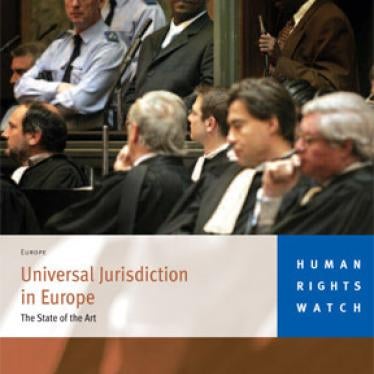(London) - The United Kingdom should prosecute four Rwandans accused of participating in genocide instead of sending them to Rwanda for trial, said Human Rights Watch today. An extradition hearing for the four, who are being sought by the Rwandan government, begins on November 5.
“The Rwandan judicial system has implemented important reforms such as abolishing the death penalty last July,” said Richard Dicker, director of Human Rights Watch’s International Justice Program. “But there is still not sufficient assurance that courts are independent. In several sensitive trials we’ve seen political interference resulting in verdicts that don’t fit the evidence.”
Human Rights Watch was one of the first organizations to denounce the genocide and call for international action to stop it. Since the end of the genocide, Human Rights Watch has provided expert testimony in trials of 37 persons accused of genocide and war crimes at the International Criminal Tribunal for Rwanda (ICTR) and in courts in Belgium, Switzerland and Canada.
Human Rights Watch is concerned that the transferred persons may not be able to present witnesses in their defense, one of the basic pillars of a fair trial. “We have documented cases where officials have intimidated and even detained witnesses in order to influence their testimony,” said Dicker.
Under UK law, extradition requests must be refused if it would breach the rights of the accused as accorded by the European Convention on Human Rights. The right to a fair trial is guaranteed under Article 6 of the convention.
“Rwandan laws generally guarantee the right to fair trials,” said Dicker. “But our observations of several trials and our discussions with Rwandan judges, prosecutors and lawyers lead us to conclude that there is often a serious gap between the law and the reality.”
Rwandan officials regularly denounce the continued existence of “genocidal ideology,” a vaguely defined crime for which hundreds of persons have been tried, and some convicted and sentenced to prison terms. Fear of being labeled a supporter of “genocidal ideology” discourages potential witnesses from agreeing to testify for persons accused of genocide.
Human Rights Watch is also concerned by the increasingly prevalent practice of trying a person twice for the same crime. Rwandan judicial authorities admit that dozens of persons who have been tried for crimes in conventional courts are once again facing charges for the same crime in courts specializing in genocide prosecutions, known as gacaca jurisdictions. The International Convention on Civil and Political Rights, to which Rwanda is a party, forbids this practice, commonly known as double jeopardy.
The UK could prosecute the Rwandans for war crimes since its domestic courts have universal jurisdiction for grave breaches of the Geneva Conventions. Where appropriate, the accused could also be prosecuted in the UK for torture, since courts exercise universal jurisdiction for breaches of the UN Convention Against Torture. Prosecution for genocide would not be possible under UK law because the law applies only to genocide committed after the law came into force, in June 2001, and is limited to people resident in the UK at the time when the crime was committed.
These limits weaken UK capacity to deliver justice for genocide. “The law should be amended to reflect the importance of prosecuting this most heinous of crimes no matter where or when it was perpetrated,” said Dicker.
In the meantime, the UK should support extending the mandate of the ICTR, which is due to finish trials at the end of 2008. Cases of genocide should then be referred to the ICTR.
Belgium is currently considering a Rwandan request to extradite Emmanuel Bagambiki, who was acquitted of genocide charges by the ICTR. After his acquittal, Bagambiki was tried and convicted in absentia in Rwanda on charges of rape as a form of genocide. Bagambiki was not indicted for rape at the tribunal. Rwanda has asked Belgium to extradite the man or to prosecute him in Belgium.
“Since the Rwandan government is ready to agree to suspects being prosecuted in Belgium, it would presumably have no objection to having others tried in the UK,” said Dicker. “Prosecution in the UK would be a first step in assuring that these serious crimes do not meet with impunity.”







